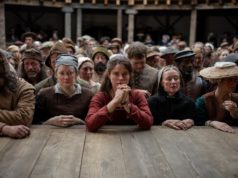Officially, France is a colorblind society. Unofficially, many French people of color don’t have access to the same economic and educational opportunities that white people do. This is a big reason why black and Arab youths rioted in large numbers in France’s major cities in 2005 and in smaller numbers periodically since and why their country, unlike ours, has no prominent black politicians, scientists, business leaders, or public intellectuals. The line about being colorblind (embraced by all of France’s major political parties) is often just a way of avoiding discussion of all this.
So it goes in French cinema, which typically doesn’t touch race as a subject. God knows that Hollywood could do far more on this score, but the French haven’t produced a Spike Lee or a Tyler Perry. The situation’s not much better for black actors, who often find even supporting roles hard to come by, unless they’re playing street thugs. All this helps explain why The Intouchables, a blandly innocuous cross-racial buddy comedy, received such adulation in its homeland. The second-biggest box-office hit in French history, it swept every award in sight and won a standing ovation when it screened for France’s leading film critics, who are the furthest thing imaginable from a bunch of cheerleaders. In light of that, you’ll likely find the movie itself underwhelming, but its success in France tells us a few things.
The plot is based on the real-life relationship between champagne manufacturing heir Philippe Pozzo di Borgo and Moroccan immigrant Abdel Sellou. (Racism in France is as much about Arabs as it is about blacks, but that’s a subject unto itself.) The story begins with Senegalese immigrant Driss Bassari (Omar Sy) applying for a job as a personal nurse for a rich white Parisian named Philippe (François Cluzet), who is paralyzed from the neck down after a paragliding accident. The severely underqualified Driss is applying only to extend his government unemployment benefits by failing to land the job. Yet Philippe takes him on, having already fired or driven away a string of nurses and grown weary of professional caregivers’ impersonal touch. The two men discover that, despite having so little in common, they can be the best of friends.
This is the first effort American audiences have seen from the filmmaking team of Olivier Nakadache and Éric Toledano. It’s hardly the tidiest piece of work; we’re informed early on that Driss has just gotten out of prison after a six-month stint for armed robbery, but the script mysteriously makes no further reference to this. Supposedly Philippe has driven away previous nurses with his surly attitude, but we don’t really see that. Instead, we’re given hijinks, as Driss hires a masseuse to tease Philippe’s one remaining erogeneous zone (his ears) and shaves his facial hair into funny shapes. There are some laugh-out-loud bits like a scene at the opera, but the movie never builds up much momentum, comic or otherwise.
Much of the entertainment value here comes from the central relationship, in which Driss wins over his boss simply by kidding him about his disability rather than tiptoeing around it. This hinges on the rapport between Cluzet (whom you may have seen starring in the thriller Tell No One) and the strappingly handsome Sy, whose dynamic presence and energy play well off the restraint of his wheelchair-bound co-star. Sy (pronounced “see”) even makes tolerable a scene that would plunge any Hollywood movie today into trouble for stereotyping, in which Driss blasts Earth, Wind & Fire at Philippe’s stuffy birthday party and hits the dance floor.
If there’s an American analogue to this movie, it’s probably Driving Miss Daisy. That movie offered the sanitized feel-good version of race relations that audiences wanted, but it was only one year later that Spike Lee set screens ablaze with his own angry, unvarnished take on matters. If there’s a French Spike Lee out there, he or she will find a way to similarly blast French audiences out of their complacency. It will be incendiary. It will make The Intouchables look fusty and outdated or worse. We will not see it coming until it’s upon us. It will probably be awesome.
In the meantime, we have this comedy in front of us. In its own way, it’s a small measure of progress for French cinema and French society, but it’s also a sign that they have a long way to go. So do the rest of us.
[box_info]
The Intouchables
Starring François Cluzet and Omar Sy. Written and directed by Olivier Nakache and Éric Toledano. Rated PG-13.
[/box_info]












France is such a racist country, you can hardly imagine…
Indeed, France does not keep any racial statistics, so how could this person possibly know that there are no prominent black people? I can think of dozens with quite a bit of black ancestry, but I guess that since French people don’t go around saying “I’m black” like in the United States, it is considered to be a fault by… what is it? A film critic?